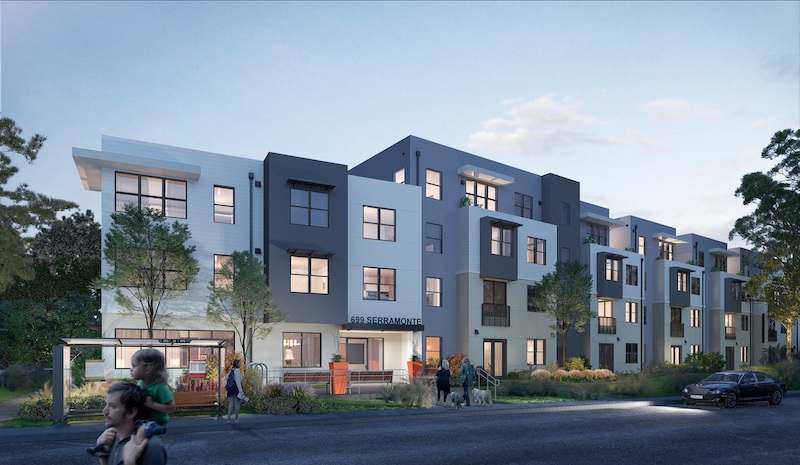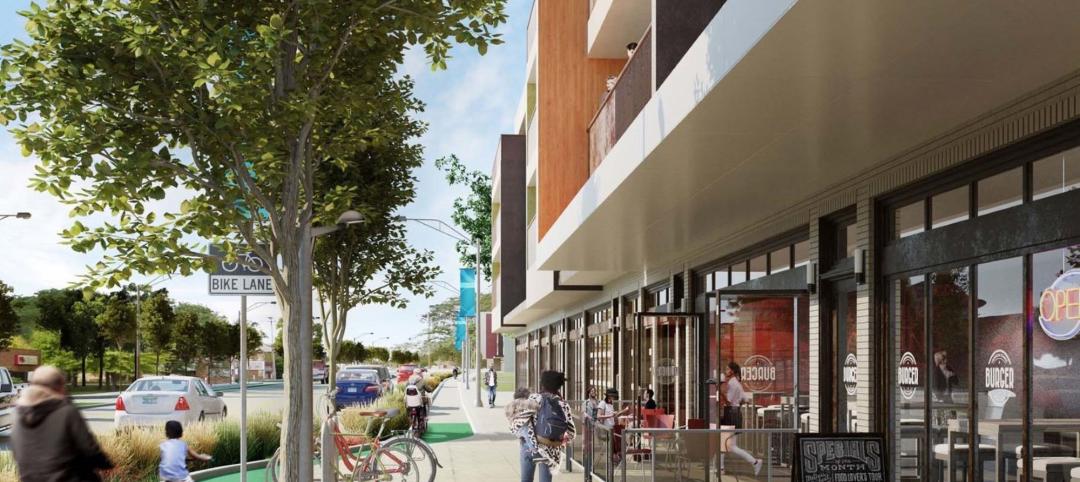The affordable housing shortage in the U.S. is particularly acute in California, where less than one-third of the state’s households can afford a median-priced home that now tops $600,000, or more than twice the national average.
School districts in California’s priciest regions have had trouble attracting and holding onto K-12 teachers whose midrange annual salaries, statewide, are from $67,032 to $87,373 for high school districts; $65,210 to $81,840 for elementary school districts; and from $63,243 to $74,676 for Unified School Districts, according to the California Department of Education.
An analysis last year by EdSource found that in 47 Bay Area school districts, even the highest-paid teachers could only afford a one-bedroom apartment.
To address this need, several of the state’s counties and school districts—including those in Santa Clara, San Francisco, Sonoma County, West Contra Costa, and Mountain View—have either approved the construction of affordable housing for teachers and staff, or are considered it.
One of these districts is Jefferson Union High School in Daly City, where in June 2018 voters approved Measure J, a $33 million general obligation bond to help pay for the construction of affordable apartments for teachers and staff, a first for this state.
This $61 million Serramonte Faculty and Staff Housing project for Jefferson Union High School District broke ground on February 5, and its first units are scheduled to available in the spring of 2022. The facility will consist of 122 apartments, with 59 one-bedroom, 55 two-bedroom, and eight three-bedroom units. The homes will range from 640 to 1,270 sf. Most important, the units’ rent rates will be 50% of market rates at the time occupancy.
J.H. Fitzmaurice, a general contractor based in Emeryville, Calif., is the GC on this project, which SVA Architects designed. The school district, comprised of five schools and a Youth Health Center, has just under 4,900 students, according to the latest data.
A September 2017 survey of the district’s employees (48.5% of whom were tenured teachers), found that 25% of 266 respondents said they were “very interested” in employee housing, 14% were “somewhat interested,” and 24% “would consider” leasing. At the time of the survey, 41.2% of 262 respondents said they owned their homes.
Nearly one-quarter of total respondents were paying between $2,000 and $2,499 per month in rent or mortgage, 13.2% were paying $2,500 to $3,000, and 12.8% were paying more than $3,000. That translated to 29.7% of respondents who were spending 31% to 40% of their household monthly incomes for rent or mortgage, 17.7% paying between 41% and 50% of their incomes, and 13.5% paying more than 50%.
Related Stories
MFPRO+ New Projects | Oct 30, 2024
BIG’s One High Line finally reaches completion in New York City’s West Chelsea neighborhood
One High Line, a luxury residential project spanning a full city block in New York’s West Chelsea neighborhood, reached completion this summer following years of delays related to investor lawsuits.
MFPRO+ New Projects | Oct 30, 2024
Luxury waterfront tower in Brooklyn features East River and Manhattan skyline views
Leasing recently began for The Dupont, a 41-story luxury rental property along the Brooklyn, N.Y., waterfront. Located within the 22-acre Greenpoint Landing, where it overlooks the newly constructed Newtown Barge Park, the high-rise features East River and Manhattan skyline views along with 20,000 sf of indoor and outdoor communal space.
Multifamily Housing | Oct 28, 2024
A case for mid-rise: How multifamily housing can reshape our cities
Often referred to as “five-over-ones,” the mid-rise apartment type is typically comprised of five stories of apartments on top of a concrete “podium” of ground-floor retail. The main criticism of the “five-over-one” is that they are often too predictable.
Adaptive Reuse | Oct 22, 2024
Adaptive reuse project transforms 1840s-era mill building into rental housing
A recently opened multifamily property in Lawrence, Mass., is an adaptive reuse of an 1840s-era mill building. Stone Mill Lofts is one of the first all-electric mixed-income multifamily properties in Massachusetts. The all-electric building meets ambitious modern energy codes and stringent National Park Service historic preservation guidelines.
MFPRO+ News | Oct 22, 2024
Project financing tempers robust demand for multifamily housing
AEC Giants with multifamily practices report that the sector has been struggling over the past year, despite the high demand for housing, especially affordable products.
Products and Materials | Oct 17, 2024
5 multifamily tech products for your next project
Multifamily housing and technological upgrades go hand-in-hand. From the rise in electric vehicle charging needs to the sophistication of smart home accessories, tech products are abound in the multifamily space.
Codes and Standards | Oct 16, 2024
North Carolina’s code policies likely worsened damage caused by Hurricane Helene
The North Carolina Legislature’s rejection of building code updates likely worsened the damage caused by Hurricane Helene, code experts say. Over the past 15 years, lawmakers rejected limits on construction on steep slopes, which might have reduced the number of homes destroyed by landslides.
MFPRO+ News | Oct 16, 2024
One-third of young adults say hurricanes like Helene and Milton will impact where they choose to live
Nearly one-third of U.S. residents between 18 and 34 years old say they are reconsidering where they want to move after seeing the damage wrought by Hurricane Helene, according to a Redfin report. About 15% of those over age 35 echoed their younger cohort’s sentiment.
Student Housing | Oct 9, 2024
University of Maryland begins work on $148 million graduate student housing development
The University of Maryland, in partnership with Campus Apartments and Mosaic Development Partners, has broken ground on a $148.75 million graduate student housing project on the university’s flagship College Park campus. The project will add 741 beds in 465 fully furnished apartments.
MFPRO+ News | Oct 9, 2024
San Francisco unveils guidelines to streamline office-to-residential conversions
The San Francisco Department of Building Inspection announced a series of new building code guidelines clarifying adaptive reuse code provisions and exceptions for converting office-to-residential buildings. Developed in response to the Commercial to Residential Adaptive Reuse program established in July 2023, the guidelines aim to increase the viability of converting underutilized office buildings into housing by reducing regulatory barriers in specific zoning districts downtown.

















